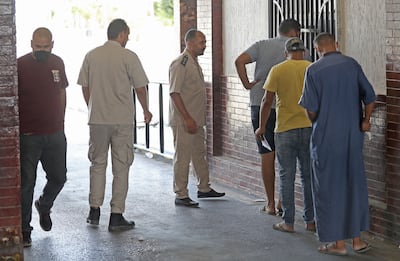Libya’s Tripoli-based National Unity Government and Tunisia have reached an agreement to reopen the Ras Ajdir border crossing between the two North African countries after more than three months of closure.
The crossing, which was shut down in March due to armed clashes between residents of the city of Zuwara and security forces, will reopen on Thursday but only for emergency cases, the Libyan Ministry of Interior said on Wednesday.
“Based on the outcomes of the meeting and the signing of an agreement between the two parties [Tunisian and Libyan] ... it includes opening the four common gates at the border for the entry of citizens from the two countries and resolving the problem of name similarity,” its statement said.
Many people on both sides of the border share the same first and family names, leading to some being mistakenly identified as wanted criminals or terrorists.
After a meeting between the Libyan Minister of Interior, Imed Trabelsi, and his Tunisian equivalent, Khaled Nouri, in Tripoli, it was also agreed that a full reopening will take place on June 20.
That will come after the completion of maintenance operations, changes of security personnel and upgrading the quality of the border crossing in accordance with international standards.
The two interior ministries said that they will be establishing six electronic registration centres for Libyan citizens’ cars, and will exempt them from entrance fees if no armed clashes take place.
“The mechanism for reopening the Ras Ajdir border crossing was discussed in order to facilitate the trade movement between the two countries, in addition to discussing ways to strengthen bilateral relations and work to overcome all the difficulties facing it,” Tunisia’s Ministry of Interior said late on Wednesday.

Armed confrontations on the Tunisia-Libya border recur due to long-running conflicts in Libya that broke out after the toppling of dictator Muammar Al Qaddafi in 2011.
Fighting over the years has shut down key infrastructure, including oilfields, government buildings, airports and major roads.


